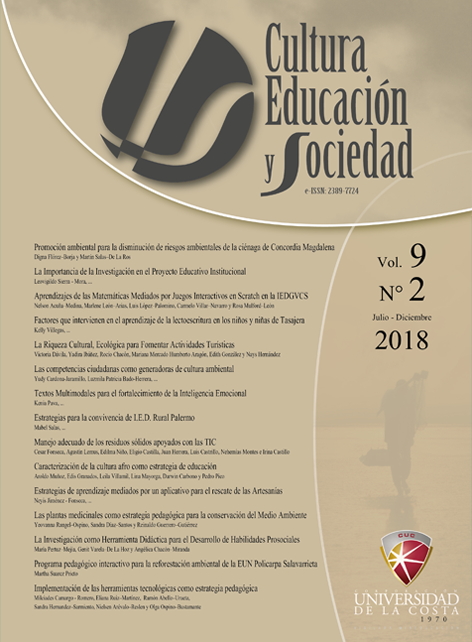Characterization of afro culture as an education strategy
DOI:
https://doi.org/10.17981/cultedusoc.9.2.2018.10Keywords:
Characterization; culture; strategy; afro; educationAbstract
The objective of this research was to demonstrate the characterization of Afro culture as an education strategy. The development of the study is framed in authors such as Sánchez, Arrocha, under a descriptive cut as what is done is to describe realities. "That is, saying what a certain phenomenon is like and what it is. Descriptive studies seek to specify the important properties of people, groups, communities or any other phenomenon that is subject to analysis. Measure or evaluate various aspects, dimensions or components of the phenomenon or phenomena to investigate to (40) students of different courses. As a result, it could be observed that the educational community of the IED San Juan de Palos Prieto highlights the importance of celebrating the day of Afro-Colombianeidad since we are a mestizo race. That the Afro character of the world population is not a matter exclusively of these, but that it is a patrimony of humanity for what it means for universal knowledge.
Downloads
References
Andrade, M. (2011). El Afro en la Escuela: Cátedra de Estudios Afrocolombinos. Antioquia, Colombia. Obtenido de http://ayura.udea.edu.co:8080/jspui/bitstream/123456789/219/1/EB0271.pdf
Antón, J., Bello , Á., Del Popolo, F., Paixao, M., & Rangel, M. (2005). Afrodescendientes en América Latina y el Caribe: Del reconocimiento estadístico a la realización de derechos. (CEPAL, Ed.) Chile. Obtenido de http://repositorio.cepal.org/bitstream/handle/11362/7227/S0900315_es.pdf?sequence=1&isAllowed=y.
Antón, J., Bello, Á., Del Popolo, F., Paixao, M., & Rangel, M. (2009). Afrodescendientes en América Latina y el Caribe: Del reconocimiento estadístico a la realización de derechos ( S.09.II.G.47 ed.). (N. Unidas, Ed.) Santiago de Chile, Chile. Obtenido de http://repositorio.cepal.org/bitstream/handle/11362/7227/S0900315_es.pdf?sequence=1&isAllowed=y
Avendaño ,I;Cortés O , Guerrero Hilda( 2015) Competencias sociales y tecnologías de la información y la comunicación como factores asociados al desempeño en estudiantes de básica primaria con experiencia de desplazamiento forzado Diversitas: Perspectivas en Psicología, vol. 11, núm. 1, 2015, pp. 13-36 Universidad Santo Tomás Bogotá, Colombia.http://www.scielo.org.co/pdf/dpp/v11n1/v11n1a02.pdf.
Bartomeu, F. (1997). Una sospechosa identidad. Perfiles Educativos, (75 ed., Vol. 19). (IRESIE, Ed.)
Carvajal, Á. (2008). Teorías y modelos: Formas de representación de la realidad. Comunicación, 12(1). Obtenido de http://revistas.tec.ac.cr/index.php/comunicacion/article/view/1212/1118
Carvalho, J. d. (2002). Las culturas Afroamericanas en Iberoamérica: lo negociable y lo innegociable. Brasilia, Brasil. Obtenido de http://www.nacionmulticultural.unam.mx/reconocimientopueblosnegros/docs/178.pdf
Chalá, J. (02 de Julio de 2006). La esclavización nos quitó hasta el nombre. Obtenido de https://www.eluniverso.com/2006/07/02/0001/12/61C7C90069B04D12A753A2C0D9A87FE2.html
García, J. (2001). Comunidades afroamericanas y transformaciones sociales. (C. L. Sociales, Ed.) Buenos Aires, Argentina: CLACSO. Obtenido de http://biblioteca.clacso.edu.ar/clacso/gt/20100912035544/4garcia.pdf
Ianini, O. (1975). Esclavitud y capitalismo. Obtenido de http://marxsimoanticapitalista.blogspot.com.co/2013/04/esclavitud-y-capitalismo-octavio-ianni.html
Mejía, J. (1989). Sistematizar nuestras prácticas educativas. (C. d. Popular, Ed.) Bogotá, Colombia. Obtenido de http://centroderecursos.alboan.org/sistematizacion/es/registros/689-sistematizar-nuestras-practicas-educativas
Miguelez, M. M. (2006). La investigaciópn cualitativa (síntesis conceptual). Revista II PSI, 09, 123, 146. Obtenido de http://sisbib.unmsm.edu.pe/bvrevistas/investigacion_psicologia/v09_n1/pdf/a09v9n1.pdf
Mineducación. (2002). Cátedra de estudios Afrocolombianos. Bogotá, Colombia. Obtenido de https://www.mineducacion.gov.co/1759/articles-339975_recurso_2.pdf
Oliveira, D. d. (2001). Racismo Estructural - Apuntes para una Discusión Conceptual. (ALAI, Ed.) Irene León. Obtenido de https://repositorio.cepal.org/bitstream/handle/11362/7227/S0900315_es.pdf;jsessionid=6D2C97AEB1EA490AE09F2EE466ACA7CD?sequence=1
Palacios , E., Hurtado, O., & Benítez, M. (2010). Aprender de la memoria cultural afrocolombiana. Valle del Cauca, Colombia. Obtenido de file:///C:/Users/HP/Downloads/art%C3%ADculo_redalyc_99618003002.pdf
Rahier, J. (1998). Estudios de negros en la antropología ecuatoriana; presencia, invisibiidad y reproducción del orden racial espacial. (Vol. III). Quito, Ecuador.
Rangel, M. (2005). Una panorámica de las articulaciones y organizaciones de los afrodescendientes en América Latina y el Caribe. (N. Unidas, CEPAL, & UNFPA, Edits.) Santiago de Chile, Chile. Obtenido de https://repositorio.cepal.org/bitstream/handle/11362/7227/S0900315_es.pdf?sequence=1&isAllowed=y
Sánchez, A. (2017). REPRESENTANDO “LO AFRO”: CONSUMO CULTURAL DE DANZAS AFRICANAS POR PARTE DE PRACTICANTES BOGOTANOS. Universidad Distrital Francisco José de Caldas, 12(21). Obtenido de https://revistas.udistrital.edu.co/ojs/index.php/c14/article/view/11900/html
Stavenhagen, R. (2001). El derecho de sobrevivencia: la lucha de los pueblos indígenas en América Latina contra el racismo y la discrimincaión. Santiago de chile, Chile. Obtenido de https://www.cepal.org/mujer/publicaciones/sinsigla/xml/6/6826/sobrevivencia_stavenhagen.PDF
Torre, C. d. (1996). El racismo en Ecuador: Experiencias de los indios de clase media. (C. A. Popular, Ed.) Quito, Ecuador: CAAP. Obtenido de http://biblioteca.clacso.edu.ar/Ecuador/caap/20120928023907/torre.pdf
Wabgou, m. (2008). Migraciones internacionales y cambio social en las sociedades modernas. Bogotá, Colombia. Obtenido de https://revistas.unal.edu.co/index.php/recs/article/view/9653/10219
Downloads
Additional Files
Published
How to Cite
Issue
Section
License
Copyright (c) 2018 CULTURA EDUCACIÓN Y SOCIEDAD

This work is licensed under a Creative Commons Attribution-NonCommercial-NoDerivatives 4.0 International License.
![]()
Creative Commons 2020 CULTURA EDUCACIÓN Y SOCIEDAD
This article is under international license Creative Commons Reconocimiento-NoComercial-SinObrasDerivadas 4.0.
The published articles are the sole responsibility of their authors and do not necessarily reflect the opinions of the editorial committee.
CULTURA EDUCACIÓN Y SOCIEDAD respects the moral rights of its authors, who assign to the editorial committee the patrimonial rights of the published material. In turn, the authors inform that this work is unpublished and has not been previously published.
All articles are under a:
Licencia Creative Commons Atribución-NoComercial-SinDerivadas 4.0 Internacional.
![]()


 English
English
 Español (España)
Español (España)




_12.53_.27_p_. m_._3.png)





_12.57_.35_p_. m_._3.png)
_12.50_.37_p_. m_._3.png)



